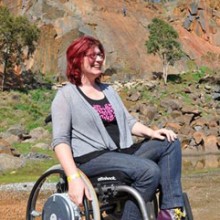NDIS: Navigating the new system
“Draw a circle,” I said.
It was in one of those classrooms where many people drew circles and talked about things like personal space and public and private behaviours and how to make a cup of tea.
He dutifully drew a circle.
“Now draw another circle around it, “I told him. He did and I filled in the gaps, drawing more circles – family, friends, paid support, others.
That’s what we were taught to do, to help people understand their boundaries.
Paid support workers won’t hug you, but they will take you to your day programme. Friends and family live in the same circle, and they will hug you as much as you want.
He looked at me. “Why are they in circles?”
That’s the question that keeps coming up. Who else in the world has areas firmly delineated by ‘professional boundaries’ when it comes to your day-to-day life? How can you compartmentalise your whole life into little circles?
These were the first words of a blog I wrote some months ago, which explored recurring themes around the disability sector. Disability as it looks right now, in a time of critical reform.
Square pegs and new thinking
The service providers are grappling with the need to change old models that do not always fit new ways of thinking, the bureaucrats are struggling to make a large and developing system encompass the needs of the most diverse of all populations.
The intricacies of having to co-author plans for people’s lives with the same pen that we write policies and procedures designed to fit the best interests of the workers or the agency, the same pen with which we write both person centred plans and risk management. You can’t define relationships, no matter how much you want to clarify boundaries. You can’t compartmentalise lives, because we are complex and intricate, all of us.
Time for us to stop drawing circles and start looking at the spaces in between.
It was almost predictable, that the disability sector would suddenly wake up and stop navel gazing and realise that the ‘real world’ lies outside the circles.
It reinforces to m that we’re actually investigating inclusive practice rather than just talking about it.
Suddenly, people are talking about how the NDIS might allow someone to access a TAFE course or join a scout troop or be part of a community they’ve never really been part of.
The only problem is we’re doing it from inside the disability sector.
Who is doing that work, looking outside the circles? Who is investigating the concept of community and how communities are formed, and how and more importantly why they support people well?
Who is looking at where people have stepped outside the circles to the spaces in between, rupturing the old lines, pushing fresh ideas and new ways to include people?
Steering our own futures
‘Community navigator’, said someone for the first time a few weeks ago, and I got chills down my spine.
Imagine the impact of that work – a navigator who will stand side by side with a person with a disability and plan a journey, advise community and the sector about the route and how to avoid hazards.
Not a planner, not a local area coordinator. A navigator.
Whose work is it, investigating the spaces in between, elbowing to make enough room for all of us to fit?
I don’t think it is the work of an agency, or the community, or of people with disability and their families. That work belongs to all of us.
All of a sudden, I hear people talking about men’s sheds and geocaching and pole dancing and horse riding.
The idea of the NDIS, of being in control of our own futures, has allowed us to think about erasing the circles, rubbing out the lines. Navigating our own futures.
If we’re rubbing out the lines, then the possibilities are endless. Letting the world in, as well as letting us out. Changing the attitudes of employers and community members simply by living and working and eating and playing alongside them.
Activating the National Disability Strategy, ramping up the NDIS rollout, working with community groups and mainstream organisations to ensure there is enough support in those mainstream places for us to actually belong to. rather than be tourists in our own communities.
Draw a circle, I said. I look forward to the day when we can all say ‘no’.


Join the conversation